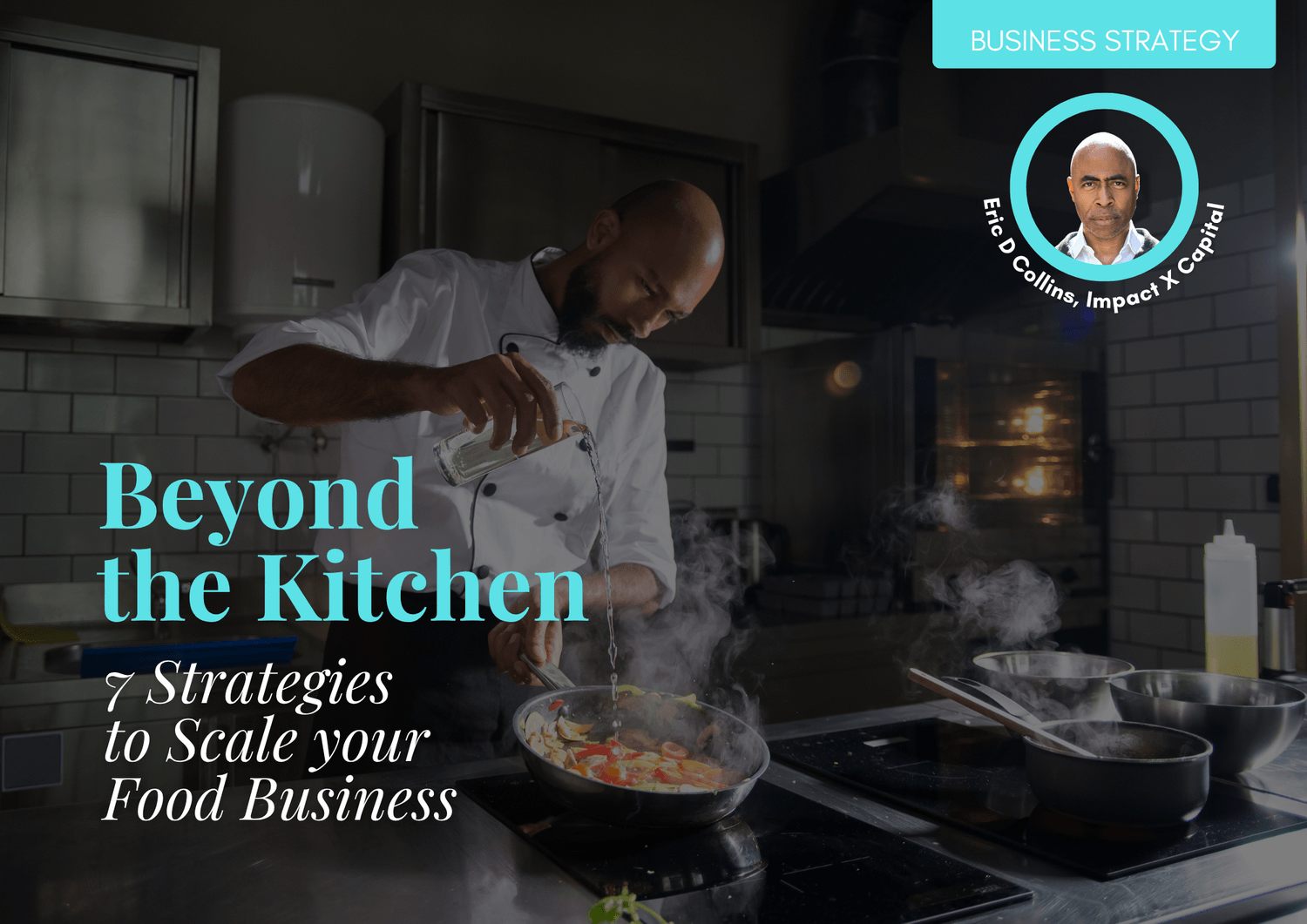
Black people have an incredibly rich and long history in food and drink enterprises, from esteemed culinary roles in historical contexts to thriving local restaurants and catering services today. This deep-rooted presence means we are undeniably entrenched in this vibrant space.
However, despite this strong foundation, many Black-owned food businesses find it challenging to scale operations in a way that generates significant wealth or builds impactful businesses that benefit our communities in a substantial way. While many succeed in supporting a family through local takeaways or catering gigs, they often don't achieve the level of revenue needed for large-scale growth.
The good news is that with strategic adjustments and a shift in mindset, your Black food business can break through these barriers and achieve exponential growth.
Here are 7 actionable ways to scale your business beyond the kitchen.
1. Shift Your Mindset to "Systems Thinking"
True scaling isn't just about selling more food; it's about viewing your business as a complex operation encompassing logistics, distribution, and even property – much like a major chain such as McDonald's. Instead of just aiming for a viable local business, define success as becoming an exclusive global supplier, a multi-location brand, or a leader in a specific niche. This requires creating repeatable processes and systems that don't solely rely on your direct involvement.
2. Unlock Value Through Processing and Branding
Selling raw materials often means competing on price alone. To command higher margins and build a strong brand, focus on processing your materials to add value. This transforms a commodity into a differentiated product. Think about how a unique sauce, a gourmet ready-meal, or a specialized spice blend can be branded and positioned to stand out. Strong branding allows you to tell your story, connect with customers, and justify a premium price point.
3. Build Robust Distribution Networks
Your delicious product needs to reach a wider audience. This involves developing effective distribution systems. Consider a
Don't be afraid to market your product beyond traditional ethnic markets to tap into broader consumer trends and preferences.
direct-to-consumer (D2C) model through e-commerce or subscription services.
Even more impactful for scaling is partnering with larger distribution networks, such as supermarket chains, specialty food stores, or even online marketplaces. Research and build relationships with distributors who align with your brand and can handle increased volume.
4. Leverage Strategic Partnerships and B2B Opportunities
Scaling often requires expertise and capital beyond what one individual or family can provide. Seek out strategic partnerships that bring complementary skills to the table.
This could mean a culinary founder partnering with someone who has a strong background in logistics, finance, or business development.
Furthermore, explore business-to-business (B2B) approaches. Consider white-labeling your processed products for other businesses to brand and sell. This can secure significantly larger orders and a more consistent revenue stream compared to relying solely on individual consumer sales.
5. Secure Essential Capital for Growth
Scaling beyond local markets, investing in new equipment, or expanding your physical footprint all require substantial investment. This capital often cannot be generated solely from existing contracts or sales. Actively seek out various forms of funding, including:
Loans: Traditional bank loans or specialized business loans.
Grants: Look for grants aimed at supporting minority-owned businesses or food entrepreneurs.
Angel Investors/Venture Capital: For high-growth potential businesses, consider investors who can provide capital and strategic guidance.
Crowdfunding: Engage your community and broader audience to raise funds.
Having a solid business plan and a clear growth strategy will be crucial for attracting investors.
6. Broaden Your Audience Appeal
While serving your core community exceptionally well is fundamental, achieving broad scale often involves appealing to a wider audience. Draw inspiration from industries like music, where artists deeply embraced by one community can naturally cross over and become popular with different groups. Your unique culinary heritage and authentic story can be a powerful differentiator that resonates with a diverse customer base.
Don't be afraid to market your product beyond traditional ethnic markets to tap into broader consumer trends and preferences.
7. Prioritize Data and Automation for Efficiency
As you grow, manual processes become bottlenecks. Embrace technology and data to streamline your operations. Implement systems for:
Inventory Management: Track ingredients and finished products efficiently.
Order Fulfillment: Automate order processing and shipping.
Customer Relationship Management (CRM): Build a database of customer information to personalize marketing and improve service.
Financial Management: Use accounting software to track revenue, expenses, and profitability.
Automating administrative tasks, from scheduling to invoicing, frees up your valuable time to focus on strategic growth initiatives rather than day-to-day minutiae.
By embracing these 7 strategies, Black food businesses can move beyond the kitchen, build sustainable empires, and cement their legacy in the global food industry.
The time to scale is now.
So, what are some specific areas of your food business where you feel you could begin implementing these scaling strategies?
Pitch Black Recommends
Colin Tomlin asks if it’s all in the mind as he shares 5 keys to improve your relationship with food.
Andrea Stewart talks about The 2 F Words We Can’t Live Without whether you like it or not.
Nicola Millington introduces 3 Key Facts and 3 Ways to go about Protecting your Peace by Navigating Online Trolling.
Dwayne Ferguson explores how AI-powered apps are personalising the way you eat by doing away with ‘one size fits all’ plans.
Pitch Black Recommends
Colin Tomlin asks if it’s all in the mind as he shares 5 keys to improve your relationship with food.
Andrea Stewart talks about The 2 F Words We Can’t Live Without whether you like it or not.
Nicola Millington introduces 3 Key Facts and 3 Ways to go about Protecting your Peace by Navigating Online Trolling.
Dwayne Ferguson explores how AI-powered apps are personalising the way you eat by doing away with ‘one size fits all’ plans.
The UK's Black Entrepreneurs & Executives Magazine is all about Celebrating us, Cheering us on & Challenging us to tune out the noise and turn up with poise.
© 2025 All Rights Reserved. Pitch Black Online Ltd. Company. Registration No. 16038699. Registered in England & Wales. Registered Office: Meadow Creek, Norwich, NR8 6HA, United Kingdom.








